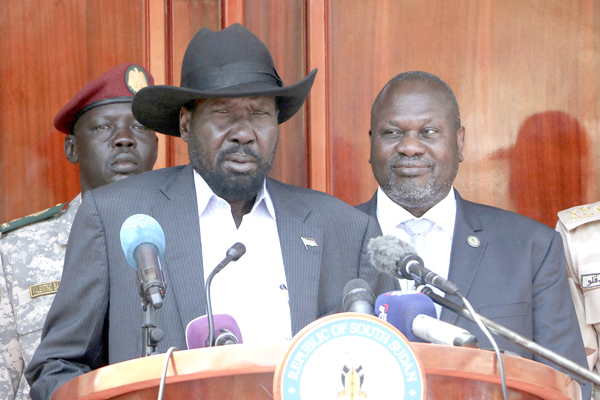South Sudan President Kiir’s tough choices ahead of December polls

South Sudan's President Salva Kiir. PHOTO | REUTERS
What you need to know:
- The South Sudan Opposition Alliance (SSOA), a coalition of opposition parties, has protested this fee, saying it is an attempt by the government to stifle democracy and restrict the participation of opposition parties in the polls.
As clock ticks to December election, South Sudan has three choices, none of which can end the conflict: Holding them outside the 2018 peace agreement or coming up with a new deal that legally cements the polls.
The chairperson of the Joint Monitoring and Evaluation Commission (JMEC), Gen (rtd) Charles Gituai says the South Sudan authorities have to either hold elections according to the 2018 or renegotiate a new deal that would allow them to hold elections outside the agreement.
Failure to do this would mean that the transitional government will have no legitimacy after February 2025, the end of the transitional arrangement.
JMEC is the watchdog that monitors the implementation process on behalf of the Inter-Governmental Authority on Development (Igad).
Gen Gituai notes that for elections to be held under the 2018 agreement, the transitional government must expedite implementation of five critical issues, or else the elections would be null and void.
These are: Full operation of the legal framework and resourcing for election related institutions; enacting a permanent constitution to guide elections; judicial reforms to deal with election-related disputes; the completion of the unification of forces; and the operationalisation of the Commission on Truth, Reconciliation and Healing, as well as Compensation and Reparation Authority.
According to South Sudan’s Minister for Cabinet Affairs Martin Elia Lomuro, the funds the government allocated for the elections are insufficient and support from foreign donors is required.
With voter registration scheduled to start in June, the electoral process requires funding, for constructing polling stations all over the 10 states, ballot printing, and other administrative requirements such as security and vehicles.
South Sudan requires $228 million, according to the minister, but the government has only been able to set aside a supplementary budget that will only cover 15 percent of the budget on top of additional expenses such as security.
There is no indication that donors will come through for Juba.
The administration has presented a supplementary budget that will only cover 63 percent of the $40 million required to develop a new constitution.
But setting the foundation for constitutional review and its enactment before December are in doubt.
Donors like the United Nations, the European Union, and other aid agencies usually provide money to ensure that the elections are conducted fairly and transparently.
To ensure the integrity of the electoral process and avoid fraud, South Sudan requires voter education campaigns, training of election officials, and monitoring.
In the meantime, the government has come up with a political parties registration fee that will virtually lock out all parties save for the Sudan People’s Liberation Movement (SPLM). Parties seeking to field candidates in the upcoming polls are supposed to pay a $50,000 registration fee. In 2010, parties had been required to pay about $150 as registration fee.
The South Sudan Opposition Alliance (SSOA), a coalition of opposition parties, has protested this fee, saying it is an attempt by the government to stifle democracy and restrict the participation of opposition parties in the polls.
There is also the ability of the judiciary to deal with election-related disputes in the absence of a comprehensive constitution. The opposition leaders are concerned that the local legal system is not impartial to deal with any future disputes.
People's Progressive Party (PPP) chairperson Gabriel Akok says that because the judiciary is presided over by an active member of the SPLM, there is uncertainty about the opposition’s ability to challenge election results.





